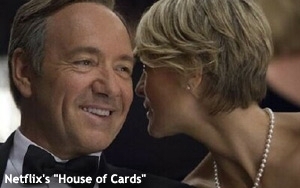Commentary
'House Of Cards': A 'Dynasty' For Our Day?
- by Ed Martin , March 12, 2014

It wasn’t exactly a binge, in that I managed to spread it out over a period of almost four weeks. But I just finished Season Two of Netflix’s “House of Cards,” and I have finally figured out why I wasn’t so wild about the show at first but now consider myself a fan.
I can’t go into too many details for fear of committing that most heinous of media crimes, the “spoil.” That’s the problem with series on Netflix -- there are no common premiere dates for their episodes as far as viewers are concerned, other than the day on which the streaming service drops a full season of a show. Over time the shows become a shared experience that can be openly discussed, but until then one must write (or read) with great caution.
Anyway, when I watched Season One of “House of Cards” last year, the extraordinary chatter surrounding the show had me convinced that it belonged alongside such TV greats as “The Sopranos,” “The West Wing” and “Breaking Bad.” Maybe my expectations were too high. “Cards” held my attention, and I thoroughly enjoyed Kevin Spacey’s portrayal of duplicitous politician Frank Underwood, but it didn’t strike me as the kind of sophisticated entertainment represented by those other fine series. It was certainly a handsome production, as smartly executed and well acted as any of the other shows commonly regarded as television’s best. But as it progressed it began to feel less profound and more lightweight, at least to me.
advertisement
advertisement
(Warning: This paragraph contains a spoiler about something that happens during Season One, so if you have yet to start watching “House of Cards” and have somehow avoided reading anything about it, don’t read this, either.) The show actually lost me when Frank Underwood, whose meticulous manipulations of virtually everyone around him (including the President of the United States) were always great fun to watch, jumped his own shark. When he could no longer manipulate Representative Peter Russo, he murdered him instead. Suddenly Frank wasn’t so special after all. If all else failed, he wasn’t above taking the easy way out. For me, “Cards” has never recovered from that moment, and if you’ve been watching Season Two you know that my problem with it has been further exacerbated.
(Okay, it’s safe to resume reading now.) Still, I stayed with “Cards,” and I’m glad I did. I’ve enjoyed it more than ever from my new perspective, brought about by lowering my expectations and viewing it instead as a simple basic prime-time serial that belongs not at the side of television’s best dramas, but alongside the soap opera legends “Dallas” and “Dynasty.” Frank Underwood is in many ways the J.R. Ewing of our time, wheeling and dealing and scheming to ensure his fortunes and keep everyone else in line. Sometimes he slips up, but he never really fails. Of course, J.R. had higher moral and ethical standards than Frank, and didn’t need to take steps as drastic as Frank sometimes does to make things go his way. J.R. was redeemable. Frank is not. But they are both hugely entertaining villains.
Frank Underwood may remind me of J.R. Ewing, but the show “Cards” most often calls to mind, at least in its second season, is “Dynasty.” In other words, “Cards” isn’t as upscale and sophisticated as its most fervid supporters would have us believe; time and again, especially in its second season, it plays more like the big-fun trash of the Carrington chronicles, which makes it a lot more fun. Watching Frank Underwood and his equally monstrous bride Claire slither around and strike down friends and foes alike, especially during Season Two, I couldn’t help but think that “Cards” is the show “Dynasty” would have been if powerful oil tycoon Blake Carrington (the late John Forsythe) had divorced his long-suffering wife Krystal (Linda Evans) and remarried his wicked ex, Alexis (Joan Collins). Rather than focus on battling each other, as they very often did, imagine if Blake and Alexis had worked as a team (the way Frank and Claire do), identifying increasingly greater goals and progressing toward them at any cost.
I wouldn’t really want to look back on “Dynasty” as anything other than what it was (even if it did fall apart in its later seasons), but I have found that looking at “House of Cards” in a different way helps me to get past the one-sidedness of it all (the powerful crush the ordinary, over and over again) and the improbability of certain narrative turns, and instead enjoy all of the nasty behavior on screen. I sometimes think this is Spacey’s approach to it, as well. Frank’s many moments in which he broke the fourth wall and addressed the viewer in season one generally proved annoying and disruptive. But in Season Two they enhance every episode, and in most instances Underwood’s comments -- or just his glances – are really very funny.
In Season Two “House of Cards” is loaded with all kinds of surprises as it barrels along, all but defying a good binge. Spacey and his co-star Robin Wright are better than ever, delivering Emmy-caliber work in every scene they’re in. (In fact, I think the always mesmerizing Wright should now be considered the top contender for Outstanding Lead Actress in a Drama.) The supporting cast this season is also filled with standouts, especially Michael Kelly as Chief of Staff to the Vice President Douglas Stamper, Molly Parker as House Majority Whip Jacqueline Sharp and Emmy-worthy Reg E. Cathey as BBQ joint owner Freddy Hayes. And then there’s Nathan Darrow as Secret Service agent Edward Meechum, who is a key player in what may be the most memorable and unexpected sequence of the season. Semi-spoilerish hint: It’s a sex scene the likes of which you may never have seen and that you won’t see coming.



